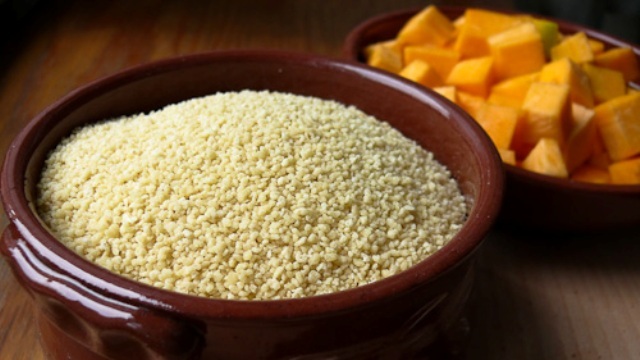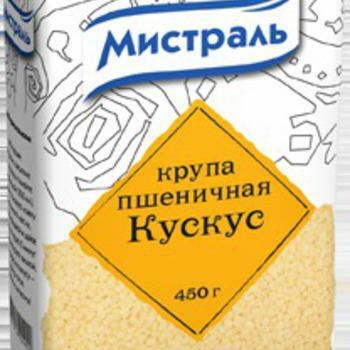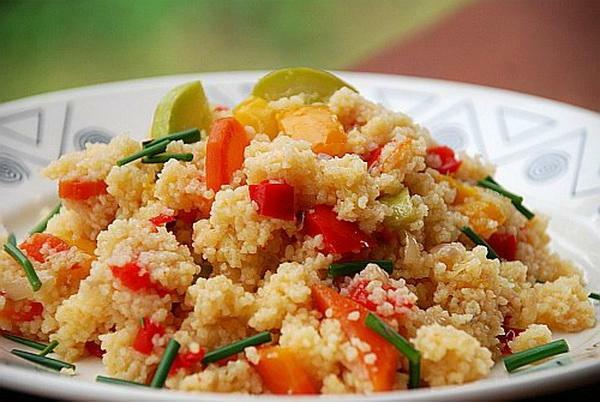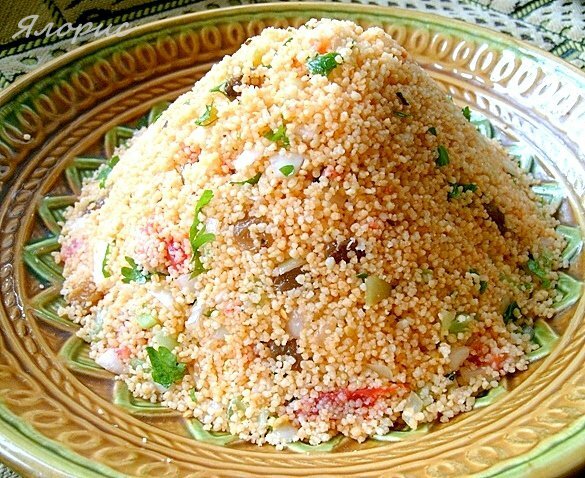Couscous: benefit and harm
 Couscous is usually referred to as oriental dishes.However, he plays an important role in the diet and residents of Libya, Algeria, Tunisia, Tripolitania.Couscous also enjoys great popularity in countries such as Italy, France and Israel.It is worth noting that in Sicily in honor of this product every year a celebration is held, where culinary experts from all over the world treat guests to new dishes from couscous.
Couscous is usually referred to as oriental dishes.However, he plays an important role in the diet and residents of Libya, Algeria, Tunisia, Tripolitania.Couscous also enjoys great popularity in countries such as Italy, France and Israel.It is worth noting that in Sicily in honor of this product every year a celebration is held, where culinary experts from all over the world treat guests to new dishes from couscous.
 It is interesting that in the Eastern countries, the couscous was always considered a matter of purely female hands.The very process of cooking couscous looked like this.First small grains of manga were sprinkled with water, and then all this was sprinkled with dry groats.Small balls were rolled from the received mass manually.In addition to semolina, couscous was also used for rice, millet and barley.Now in our stores you can often find wheat couscous.
It is interesting that in the Eastern countries, the couscous was always considered a matter of purely female hands.The very process of cooking couscous looked like this.First small grains of manga were sprinkled with water, and then all this was sprinkled with dry groats.Small balls were rolled from the received mass manually.In addition to semolina, couscous was also used for rice, millet and barley.Now in our stores you can often find wheat couscous.
Nutritional value couscous and its chemical composition
Nutritional value of 100 g:
- Calories: 112 kcal
- Proteins:
- 3.79 g Fat: 0.16 g
- Carbohydrates: 2182 c
Display a list »
- Dietary fiber: 1.4 g
- Ash: 0.26 c
- Water: 72.57 grams
- Mono- and disaccharides: 0.1 c
- saturated fatty acids: 0.029 c
Vitamins:
- Vitamin B1( thiamine) 0.063 mg
- Vitamin B2( riboflavin) 0.027 mg
- Vitamin B5( pantothenic): 0.371 mg
- Vitamin B6( pyridoxine): 0.051 mg
- Vitamin B9( folic): 15. mu.g
- Vitamin E( FE): 0.13 mg
- Vitamin K( phylloquinone):0.1 ug
- Vitamin PP( niacin equivalent): 0.983 mg Choline
- 3.3 mg
Macronutrients:
- Calcium: 8 mg Magnesium
- 8 mg
- Sodium 5 mg
- Potassium:
- 58 mg Phosphorus 22 mg
Microelements:
- Iron 0.38 mg Zinc
- : 0.26 mg
- Copper 41 mcg
- Manganese: 0,084 mg
- Selenium: 27.5 μg
Couscous contains a large number of amino acids( AK), which play a very important role in the construction of all protein structures in the human body.When consuming couscous, the body is saturated with such AK as glutamic acid, glycine, valine, proline, arginine, leucine, lysine, aspartic acid, etc.
Also, couscous is an excellent source of B vitamins( B1, B2, B5,B6, B9) and such chemical elements as iron, potassium, phosphorus, zinc and copper.
Useful properties of the couscous
 To begin with, it should be noted that the maximum benefit of the couscous is only displayed if the dish is steamed.It is with this method of cooking that it is possible to keep the most amount of useful microelements in the product.
To begin with, it should be noted that the maximum benefit of the couscous is only displayed if the dish is steamed.It is with this method of cooking that it is possible to keep the most amount of useful microelements in the product.
Thanks to the significant amount of B vitamins in this product, its regular consumption allows you to get rid of depression, nervous disorders, severe fatigue, insomnia, improve mood, vitality, and also positively affect immunity.
The couscous is worth paying attention to those who want to lose weight, because valuable dietary fiber and trace elements contained in this croup, have a positive effect on the work of the digestive tract and contribute to the normalization of metabolic processes in the body.
In addition, useful minerals that enter the body with the use of couscous help to stimulate brain activity, strengthen the heart muscle, stabilize the water-salt balance, increase hemoglobin, prevent joint diseases and earlier graying of hair.This croup is a source of substances necessary for the female body to produce sex hormones.
The folic acid contained in the couscous is very useful in pregnancy, because it helps to prevent abnormalities in embryo development.This compound plays an important role in the formation of red blood cells, and also positively affects the production of serotonin - the "happiness hormone".
Harm to the couscous for the body
Unfortunately, with all its many advantages, the couscous also has some contraindications:
- Food allergy or individual intolerance to wheat and other cereals that may be contained in this crop.Before buying couscous, you should carefully study the composition of the pack, since it can be made from different cultures.
- Diabetes and thyroid problems.Couscous is a product of the average glycemic index( GI), and can aggravate the course of the disease.Therefore, people with similar problems or in the risk zone are advised to include couscous meals in their diet only after consulting the attending physician.
- Overweight.Couscous is a high-calorie product, so people who are overweight should be cautious about including this rump in their diet.Firstly, it is desirable to combine couscous with such low-calorie foods as vegetables, chicken, seafood, etc.Secondly, it is counter-indicative to combine it with meat semi-finished products and sweets, since such a combination can increase weight.
This is almost all contraindications, which should be taken into account when using couscous.If you do not belong to persons who are affected by the above limitations, then you can safely eat couscous and enjoy new interesting combinations of flavors.
Application of couscous in cooking
 Groats couscous is an ideal absorbent medium that is perfectly enriched with the aromas of saturated broths, spices and herbs.This is an excellent side dish that does not interrupt, but acquires the taste of fish, meat, vegetables or fruits.
Groats couscous is an ideal absorbent medium that is perfectly enriched with the aromas of saturated broths, spices and herbs.This is an excellent side dish that does not interrupt, but acquires the taste of fish, meat, vegetables or fruits.
As a rule, couscous is cooked in a "double boiler", which consists of two pans inserted into each other.In the bottom pan, vegetables, meat or fish, roots are cooked, and in the upper - swells, permeating the spirit of other ingredients, the croup itself.
Traditionally couscous is served in a clay bowl: the croup is poured with sauce, in the center of the dish is laid meat, around which the "fortress wall" is laid vegetables, all this is sprinkled with chickpeas or nut truffles.



